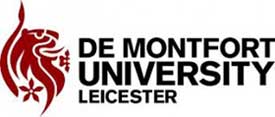About Media And Communication BA (hons) in De Montfort University
The media and communication industry has a widespread influence on the world around us, and this degree course helps enable you to be a part of that revolution.
By studying both the theory and practice of media and communications, this course can equip you with the skills and insights required to be successful in the media environment.
This can enable you to progress into diverse careers in sectors such as PR, journalism, marketing, entertainment, international relations, politics and education.
A modern focus in the teaching of this course enables students to adapt to changes and developments in industry and proficiently use the most up-to-date technology.
Key features:
- 100% of our summer 2017 graduates from this course are in work or further study ( Destinations of Leavers from Higher Education 2016-17). Graduates have gone on to work for leading companies such as Universal Pictures, Mentorn Media and AKQA.
- Our communication, cultural and media studies has been ranked joint first in the UK for the proportion of its research outputs, rated as world leading (4*) in the Research Excellence Framework 2014, the most recent evaluation of its kind.
- Designed with your employability in mind, this course includes modules focusing on media culture, photography and video and television studies.
- Gain valuable international experience as part of your studies with our #DMUglobal programme. Previous Media and Communication students have immersed themselves in Hollywood’s fan culture, learned about Berlin’s fascinating media history and explored 100 years’ worth of TV archives in New York.
- Benefit from our close links with local media partners including BBC Radio Leicester, Phoenix Cinema and Art Centre, and community media organisations.
- Access a range of multimillion-pound facilities, including editing suites, TV studios, radio studios, dark rooms, blue and green screen studios and video production laboratories
Entry criteria
- Normally 104 UCAS points from at least two A-levels, or
- BTEC National Diploma/ Extended Diploma at DMM
Plus, five GCSEs at grade 4 or above, including English or equivalent.
Alternative qualifications include:
- Pass in the QAA-accredited Access to HE with English GCSE required as a separate qualification
We will normally require students to have had a break from full-time education before undertaking the Access course.
- International Baccalaureate: 24+ points
Portfolio Required : No
Interview Required: No
International students
If English is not your first language an IELTS score of 6.0 overall with 5.5 in each band, or equivalent when you start the course is essential. English Language tuition, delivered by our British Council-accredited Centre for English Language Learning, is available both before and throughout the course if you need it.
De Montfort University Highlights
| Type of Institution |
Public |
| Campus Setting |
Urban |
| Endowment |
£1.17 million |
| Number of Campuses |
4 faculties |
| Number/Percentage of International Students |
23205 |
| Total number of Professors |
3240 |
| Student Satisfaction Rate |
86% |
| Graduate Job Rate |
97.3% |
| Number of Residence Vacancy |
Around 3000 |
| International fee |
Undergraduates- £13240 (annual) Postgraduates- £15950 (annual) |
| Number of Academic Programs |
UG, PG, Part time, distance, blended |
| Mode of Program |
Full time, distance and online |
| Average Graduate Salary |
19800 pounds a year |
De Montfort University The tuition fee (In GBP) for various programs is tabulated below:De Montfort University Average Cost
| Field of Study |
Avg.Fees |
| Art, Design and Humanities: |
£13,750 |
| Business and Law |
£13,750-£14,550 |
| Media |
£13,750 - £14,250 |
| Engineering |
£14,250 |
| Computing |
£14,250 |
| Health and Life Sciences |
£13,250 - £14,250 |
| Nursing BSc |
£14,950 |
De Montfort University The Average Tuition Fees and Other Expenses
| Expenses |
Estimated cost in pounds |
| Undergraduate tuition fee |
13,250- 14950 |
| Postgraduate tuition fee |
13600-15,900 |
| On campus accommodation |
5,000-6040 |
| Average cost of living |
97-110 per week |
DMU International Scholarship up to 1500 pounds
- TEF Gold Outstanding Alumni Scholarship up to 3000 pounds
- Leicester Castle Business School Scholarships:
- Global MBA Scholarship £3,000 - £5,000
- Full Postgraduate Scholarship
- LGBTQ + Allies Scholarship-two fully funded post graduate taught scholarship packages including full fee weaver and maintenance bursary.
- Vice Chancellor's Sports Scholarship- three different scholarship packages are available with eligible students being awarded up to 6000 pounds of support.
